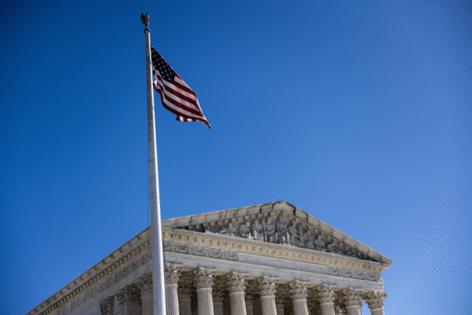Supreme Court to weigh Medicaid cutoff for Planned Parenthood
Published in News & Features
WASHINGTON — The Supreme Court is set to hear arguments Wednesday over South Carolina’s effort to keep Planned Parenthood facilities from receiving Medicaid funding if they perform abortions, part of a dispute that could impact Congress’ ability to mandate coverage in the program.
Planned Parenthood filed a lawsuit to challenge the state’s decision that they did not qualify for Medicaid reimbursements, seeking to enforce a provision in federal law that says recipients can receive care from “any qualified provider.”
The central question for the justices is whether Congress created a right for Planned Parenthood or other groups to file such a lawsuit, which involves how explicit Congress must be if it wants to allow such a right. A ruling for Planned Parenthood would mean the group can continue to pursue its lawsuit at a lower court.
But a ruling in South Carolina’s favor would give states more power to determine the bounds of Medicaid participation, experts said, including targeting providers that provide care that is disfavored, but legal.
Nicole Huberfeld, a health law professor at Boston University, said Wednesday’s arguments are part of a string of cases where states have asserted they can make decisions about health programs funded by federal dollars.
“The sole reasoning is that Planned Parenthood sometimes provides abortions, therefore they’re trying to exclude them from Medicaid. So they don’t actually have any professional qualifications concern about Planned Parenthood, it’s an ideological concern, and that isn’t a reason that a state can exclude a provider for Medicaid,” Huberfeld said.
Richard Hughes, a partner at the Epstein Becker Green law firm, said a decision in South Carolina’s favor could also open the door to states targeting providers for otherwise legal care, such as gender-affirming care that isn’t funded by Medicaid.
“If they’re unleashed, and they can go that far in determining that a provider is unqualified, and, by the way, for illegitimate reasons, right? That would embolden states to go after providers who deliver the services that they don’t like, absolutely,” Hughes said.
Jane Perkins, Litigation Director for the National Health Law Program, said that a decision in favor of South Carolina could limit a prior Supreme Court decision allowing similar suits in nursing home care and individuals’ ability to sue for care in Medicaid more broadly.
The justices are set to issue a decision in the case by the end of the court’s term in June.
The fight in Wednesday’s case started in 2018, when the state sought to exclude abortion providers from receiving Medicaid family planning funding for other services they provide. The state’s governor argued that any money that groups like Planned Parenthood receive helped subsidize abortion care.
Planned Parenthood argued in its lawsuit that Medicaid did not allow the state to exclude a provider who is otherwise qualified to provide services. A U.S. Court of Appeals for the 4th Circuit decision last year found Planned Parenthood had a right under federal law to sue for Medicaid funding.
The state, the Trump administration and Republicans in Congress have urged the justices in court filings to rein in the 4th Circuit decision. South Carolina argued in a brief that Congress meant to give states the “substantial discretion to innovate” with their Medicaid coverage without being dragged into court.
In the past, the Supreme Court has held that Congress must be specific when it’s creating the kind of court-enforceable right that Planned Parenthood has claimed, South Carolina said.
“Congress did not use such language in the any-qualified-provider provision; the provision says nothing about rights at all,” the state said.
More than 80 Republicans in Congress, in a brief filed in the case, argue that allowing Planned Parenthood to sue for coverage would tip the federalism balance in favor of Congress. Further, it would certainly increase the costs for a program that already totaled more than $820 billion in 2020, the brief said.
“The decision below—if left to stand—will increase costly litigation and breed uncertainty in budgeting. And it will stifle the flexibility Congress gave states to innovate in their Medicaid programs,” the brief said.
The Trump administration, which will be involved in the oral arguments, urged the Supreme Court to strike down the 4th Circuit decision as well, writing in a brief that programs like Medicaid represent “a bargain between Congress and the States” and allowing private suits over coverage would upset that balance.
“This Court has required Congress to speak clearly when its legislation disrupts the usual federal-State balance of power,” the brief said.
Planned Parenthood and Democrats in Congress defended the 4th Circuit’s interpretation of the law. Planned Parenthood, in a brief, said Congress meant for the state to administer the program, not meddle in decisions between Medicaid recipients and their providers.
“It protects a deeply personal right that is fundamental to individual dignity and autonomy – the right to choose one’s doctor,” the Planned Parenthood brief argued.
More than 200 Democrats in Congress signed onto a brief asking the justices to uphold the 4th Circuit decision and not require that Congress use “magic words” to create a right to sue under the law.
“Congress established this right with the expectation that it be honored,” the brief said.
The brief also pointed out that Congress added the provision to the law in 1967, after states initially tried to limit coverage to specific state-run hospitals or other state-approved care in the first few years of Medicaid.
“Congress intended for the free-choice-of-provider provision to impose on states a binding obligation to respect beneficiaries’ right to choose their providers,” the brief said.
The case is Medina v. Planned Parenthood.
©2025 CQ-Roll Call, Inc., All Rights Reserved. Visit cqrollcall.com. Distributed by Tribune Content Agency, LLC.







Comments